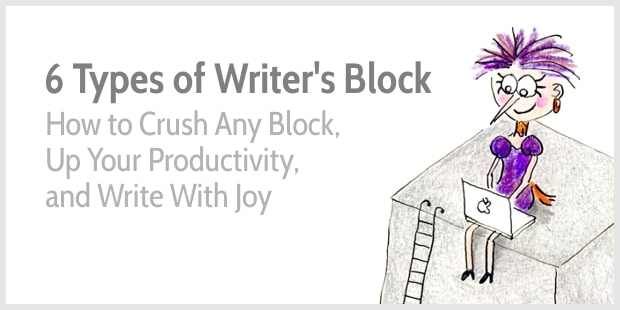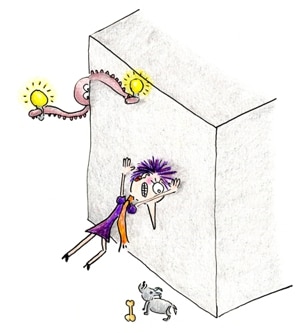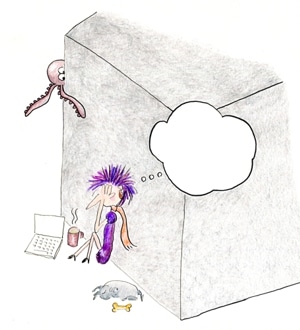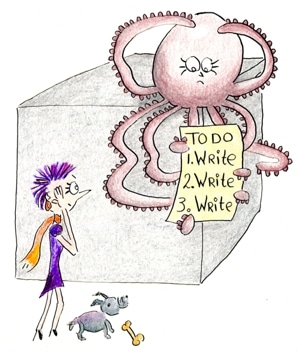 Does writer’s block exist?
Does writer’s block exist?
Jodi Picoult, who has published novels at a rate of almost one per year since 1992, suggests writer’s block is simply a sign we have too much time on our hands.
Yet, I’ve sat at my desk, trying desperately to write but feeling completely stuck.
That writer’s block felt real to me. No inspiration. Nothing at all. Nada.
Know the feeling?
You’re not alone. Probably everyone who writes will hit a smaller or bigger writer’s block at some time.
So, what do you when you hit writer’s block?
Waiting until inspiration strikes again can take ages, and it’s rather frustrating.
It’s quicker to tiptoe around or scramble over your writer’s block.
How?
First, diagnose which of the 6 types of writer’s block is stopping you.
Next, employ smart tactics to sneak around that particular block.
Shall I explain?
Writer’s Block #1: Fear of bad writing
 Whether you call it the resistance, perfectionism, or procrastination, the fear of bad writing is probably the most common type of writer’s block.
Whether you call it the resistance, perfectionism, or procrastination, the fear of bad writing is probably the most common type of writer’s block.
When we worry our writing isn’t good enough, our inner critics take charge, and getting started becomes hard, perhaps even impossible.
Many coaches suggest you show up and start writing. But silencing your inner critic isn’t always that easy.
You may need to fool your inner critic.
How?
Start by giving yourself permission to write badly. After all, it’s hard to revise a draft that only exists in your mind. Once you’ve written a rough draft—no matter how badly, you give yourself the opportunity to revise and improve it.
Here’s what Seth Godin suggests about this type of writer’s block:
(…) it’s comforting to think that we are blocked, that we’re just not in the right mood to deal with something. But people who say they have writer’s block actually have a fear of bad writing, so they’re not willing to do any writing at all. What I say to somebody who has writer’s block is, “Show me all your bad writing. Go sit down and write badly as much as you can, because sooner or later, some good stuff is going to slip through.” (…) Indeed, the job of someone who’s creating is to create, not to be perfect.
Early in my writing career, I kept reminding myself a first draft was expected to be bad. I would try to write as quickly as possible to get that draft done, so I could start revising.
Slavoj Žižek has another smart tactic to get around the fear of bad writing. He tells himself he isn’t writing, he’s simply jotting down ideas:
I have a very complicated ritual about writing. It’s psychologically impossible for me to sit down [and do it], so I have to trick myself. I elaborate a very simple strategy which, at least with me, it works: I put down ideas. And I put them down, usually, already in a relatively elaborate way, like the line of thought already written in full sentences, and so on. So up to a certain point, I’m telling myself: No, I’m not yet writing; I’m just putting down ideas. Then, at a certain point, I tell myself: Everything is already there, now I just have to edit it. So that’s the idea, to split it into two. I put down notes, I edit it. Writing disappears.
To get over the fear of bad writing, you may need to fool your inner critic, too.
Whether you give yourself permission to write badly or tell yourself you’re only jotting down ideas, the key is to get a first draft on paper, no matter how bad that draft is. Revision is the next step.
Bonus tip:
The fear of writing not only strikes at the start of a writing career. If you’ve written a good piece, the fear may creep up again. Can you write something that good again? The antidote remains the same: Remind yourself it’s okay to write a bad first draft. You may even challenge yourself to write as badly as possible.
Writer’s block #2: Lack of ideas
 When I started writing, I never had more than one or two ideas for blog posts, and I was afraid that I’d soon run out of ideas.
When I started writing, I never had more than one or two ideas for blog posts, and I was afraid that I’d soon run out of ideas.
At that time, I didn’t understand how ideas work:
1. Ideas breed ideas.
2. Ideas are everywhere; you just have to notice them.
Each blog post has a loose end that you can explore further. Each question needs an answer. Each answer raises new questions.
A discussion with a client can be the spark for a new article. A book, or a podcast, or a conversation with a friend—these can all provide ideas.
Here’s what Austin Kleon suggests about this type of writer’s block:
I often get most blocked when I lose sight of why I began my work in the first place: because I was inspired by the work of others and wanted to join in the fun.
“Most artists are brought to their vocation when their own nascent gifts are awakened by the work of a master,” Lewis Hyde writes in The Gift. “That is to say, most artists are converted to art by art itself.”
In other words: all writers are readers first.
When I stall out, it’s time to start taking things in again: read more, re-read, watch movies, listen to music, go to art museums, travel, take people to lunch, etc. Just being open and alert and on the lookout for That Thing that will get me going again. Getting out the jumper cables and hunting down a battery.
When you lack ideas, your muse has not deserted you. You’ve simply neglected feeding your creative soul.
Creative output relies on the right creative input.
So, when you lack ideas, review your input. What are you reading? What conversations are you having? Which (armchair) adventures are you embarking on?
Bonus tip:
If you listen too much to your inner critic, you may be discounting good ideas. So, be honest with yourself: Are you out of ideas or are you afraid to write about your ideas?
Writer’s block #3: Reporter’s block
 Sometimes, we have an idea but after writing a few sentences, we get stuck. We thought we had a lot to say but it now feels as if we have nothing to say.
Sometimes, we have an idea but after writing a few sentences, we get stuck. We thought we had a lot to say but it now feels as if we have nothing to say.
If that happens, you may have hit reporter’s block. You have an inkling of what you want to write but your knowledge lacks depth.
Here’s how Clive Thompson, a writer for the NYT and Wired, describes reporter’s block:
You’re having trouble writing not because you can’t find the right words, but because you don’t know what you’re trying to say. You don’t have the right facts at hand.
So the solution is to gather more facts. You need to step away from the keyboard, stop trying to write, and do some more reporting: Make phone calls to some new sources, consult new experts, read a relevant book or article. Once you have the facts at hand, the words will come.
Or to put it another way, when you’re writing nonfiction, the words flow from the research. If the words aren’t flowing, usually the problem is the research isn’t there. To say something, you have to have something to say.
If you have a good idea but your knowledge lacks depth, it’s hard to write with substance. So, deepen your knowledge: Dive into the details, find examples that illustrate your ideas, hunt for stories that provide context.
Keep exploring, and enjoy learning more.
Bonus tip:
Your inner critic might be nagging that your knowledge is insufficient. Be careful: Do you really need to do more research or do you need to overcome your fear of writing about this topic?
Writer’s block #4: Fuzzy thinking
 Do you have a lot of information to share?
Do you have a lot of information to share?
But you don’t know how it all hangs together or where to start?
When your thoughts feel complicated, entangled, or fuzzy, you may need more time to think.
Thinking is an important phase of the writing process. Content marketing pioneer Ann Handley calls it pre-writing:
Thinking is pre-writing.
And pre-writing is the key to writing.
And here’s what songwriter Carole King says about stepping away from writing:
If you are sitting down and you feel that you want to write and nothing is coming, you get up and do something else. Then you come back again and try it again. But you do it in a relaxed manner. Trust that it will be there. If it ever was once and you’ve ever done it once, it will be back. It always comes back and the only thing that is a problem is when you get in your own way worrying about it.
That need to step away can be necessary at the start but also halfway the writing process. Some parts of your ideas may be clear, and you’ve written those down. Other parts may remain fuzzy, and you need more time to think and gain clarity.
I do my best thinking while out on my daily walk. Those walks are a surprising productivity booster, helping me write faster and better. I gain clarity from playing with an idea in my mind without focusing on it too much. It’s called the diffuse mode of thinking.
The diffuse mode of thinking also works while asleep. When you sleep your mind continues processing ideas and helps you make fresh connections. This is why I spread the work of writing a blog post over a series of days.
Taking breaks can help prevent writer’s block and boosts productivity.
Bonus tip:
Stepping away from writing can feel like procrastination but deep in your heart you’ll know the difference.
Procrastination is when a task feels too daunting so you find excuses and allow yourself to get distracted. In contrast, when you let your mind wander around an idea, you’re still engaged with your idea. You’re pre-writing—thinking about what to write and how to write it in a logical order.
Writer’s block #5: Lack of process
 Getting started becomes a daunting prospect when you treat writing as one big task.
Getting started becomes a daunting prospect when you treat writing as one big task.
Do you find excuses not to get started?
Try to cut writing into smaller tasks. By focusing on one task at a time, each task becomes more doable:
- Chop the writing process up in steps, such as outlining, writing a first draft, revision, editing, proofreading, and formatting.
- Chop projects up in parts, such as an opening paragraph, one section of a chapter, a conclusion.
When you focus on one step at a time, getting started becomes easier and writing becomes more joyful.
When Hemingway feels blocked, he tells himself: “Do not worry. You have always written before and you will write now.” But more importantly, he prevents writer’s block by spreading the work over more days and always leaving something to write for the next day:
The best way is always to stop when you are going good and when you know what will happen next. If you do that every day when you are writing a novel you will never be stuck. That is the most valuable thing I can tell you so try to remember it.
(…) Always stop while you are going good and don’t think about it or worry about it until you start to write the next day. That way your subconscious will work on it all the time. But if you think about it consciously or worry about it you will kill it and your brain will be tired before you start.
From: Ernest Hemingway on Writing, compiled by Larry W. Phillips
To prevent writer’s block, make it easy to get started the next day.
Writer’s block #6: Loss of writing joy
 When writing becomes a chore, we become reluctant to write, and we find excuses not to write.
When writing becomes a chore, we become reluctant to write, and we find excuses not to write.
To take away such resistance, a lot of productivity advice suggests scheduling our work.
The advantage of scheduling is that you know what to do when. You just need to be disciplined enough to follow your plan.
While scheduling may work for many, a lot of us resist it as each task on the schedule starts to feel like a chore. It can feel like we’re bullying ourselves into doing our work, and that’s how we can lose the joy of writing.
So, how about tapping into joy instead of bullying ourselves?
Here’s what happened when Susan Piver decided to stop scheduling her days and gave herself permission to do things “for the joy of doing them rather than the obligation”:
So I didn’t schedule myself at all. Instead, I asked myself: what do I feel like doing? What would be fun for me? Write? OK. What is fun about writing? Oh, it’s so cool when it just starts to flow and plus I really enjoy thinking about things like dharma and love and creativity simply for the sake of doing so. So start there. When you’re done, ask yourself what would be fun to do next.
Which I did. And you know what? I did all the things I yell at myself to do. My day looked pretty much exactly like my days do when I succeed in being “disciplined.” Only this time, it seemed effortless. I had such a light heart.
When we tap into our joy of writing, sticking to writing habit becomes much easier.
So, remind yourself why you love writing and find a way to make it more interesting again.
Aren’t you lucky you can write today?
Make writing a choice, not an obligation.
How to crush writer’s block
 I don’t like the phrase writer’s block.
I don’t like the phrase writer’s block.
The phrase makes the blockage sound like an enormous, immovable object. Plus, thinking about a block only makes it grow bigger.
Instead, I like think of writer’s block as merely a hesitation to write.
And that hesitation is easy to overcome with a bit of self-knowledge.
First, be gentle with yourself. Next, observe why you might be stuck. Are you out of ideas? Reporter’s block? Fuzzy thinking? Has writing become a chore? Does your writing not feel good enough?
Once you understand the reasons behind your blockage, you can find the tactics to get unstuck.
Dance with your fears, tiptoe around your block, or find a ladder and climb over your block.
Happy writing!
Your illustrated guide to avoiding writer’s block

Grab the embed code below to display the infographic on your website:
Want to avoid writer’s block?
Write It, Don’t Fight It is a step-by-step course that helps you become a prolific and joyful writer
Learn more about this course >>>
Further reading on writer’s block:
The magic of crappy first drafts
An introduction to the writing process
How to stop procrastinating [infographic]


The very word ‘Procrastination’ is the perfect word to interpret this sort of blocking. and this kind of nature one will find in every realm of performing and non-performing art and literature. even nature also shows this kind of inertia.
But here I like the suggestions of Austin Kleon and Slavoj Žižek. Slavoj Žižek is one of my inspirations since I try to listen to every lecture of him which has been there on Youtube.
And Thanks again for your quintessential suggestions.
I’ve actually not checked out Slavoj Žižek’s work. I liked his thoughts about writing and how he tricks his mind to overcome procrastination / writer’s block. Thank you for the nudge to check out his other work, too!
This really helped, thank you!
Great. Happy writing, Lola!
Thank you Henneke. A very helpful load of excellent advice.
Thank you, Barry. Happy writing!
Another outstanding post. Very useful. The idea of being kind to yourself is key for so many endeavors. Particularly when trying to stick to an exercise program. Some days will be great. Others not so much. Just keep showing up. Works the same with writing. Love your stuff, Henneke. Thanks
Yes, so true. Being kind to yourself and showing up can make such positive impact in so many aspects of our lives.
Thank you for your lovely compliment, Dan. I appreciate it. Happy writing!
Hi Henneke,
It was a very helpful share! I have been facing writer’s block a lot. I think identifying the type of block and the cause behind it definitely helps get rid of this sooner. This will definitely help me get back into writing soon. Thanks a lot for sharing this.
Yes, once you know what’s causing writer’s block, you can find a way around it. Happy writing, John!
I use answer the public to generate ideas. Been enjoying writing so far so good. Thanks for the additional writing guide it will really go a long way for me.
I’m glad you’re enjoying writing! Thank you for stopping by, Newton. I appreciate it.
Hi Henneke
I have literally faced all six of them. But never thought of a systematic way to fight the block. It is a wonderful post. I came across your website for the first time and I am glad I read this article. Loved it, especially the infographic summarising the article in the end.
Thanks much!
Thank you so much for your lovely comment, Rohit. I hope the ideas in this post will help avoid writer’s block. Happy writing!
I love this Henneke, such a good summary of what causes writer’s block. Very useful to have it at hand. And I love your new character the octopus, so cute! Were you inspired by the famous documentary ;)? Big hug
Thank you, thank you, Elena. I haven’t seen that documentary but listened to a podcast with someone who has studied octopi for years, and it was so fascinating. They’re such smart animals with braincells in each tentacle. Little Octo was very fun to draw, especially as I quickly gave myself permission to draw as many (or as few) tentacles as I liked and to play with the length of the tentacles, too. Now I want to find a reason for drawing little Octo again!
Hi Henneke!
You are truly a blessing to writers. You don’t know how much good this your post on “writers’ block” has done to us. Need I say that you have won me over with that masterpiece article of yours.
I’m glad you enjoyed this post, Michael. Happy writing!
You can give a kid a book, but they just want to look at the pictures 😂
Actually, I want to thank you! It never fails… no matter what kind of funk I’m in, you hit the nail on the head with something comprehensible and inspiring ❤
That’s a lovely compliment. Thank you.
Insightful bits for this topic, Henneke! Your little octopus kept me smile too! You’ve inspired me to keep my inner critic at bay with gentle praise for just thinking about a good topic.
Hope you are well,
Kit
Thank you, Kit. I had so much fun drawing little Octo 🙂
Happy writing!
Thanks Henneke for such super useful post.
Amazing tips that you have explained. All these will sure help me while writing for my blog.
Really, Impressive Inforgraphic you have been created :):)
Thank you, Vikash. I’m glad you enjoyed this. Happy writing!
Such an interesting blog you have posted. I really enjoyed blog, especially the infographics.
Thank you, Rakesh. Happy writing!
Before reading this blog, I had this disease called, “writer’s block”.This blog was the perfect and ultimate remedy.I am know a writer ready to write. Thanks, Dr.Henneke!
Thank you, Ochieng. Happy writing!
Hi Henneke,
I loved this post and the infographic was such a welcome surprise!
I do a lot of pre-writing during walks or (well-chosen) chores and everything flows so effortlessly in my head. I often think of it as the water flowing around the rocks (or smaller boulders, let’s says, which is often the size of one’s writer’s block…) in a babbling brook . This may have something to do with the fact that my morning hikes with the dog involve hopping over a similar body of water before heading into the woods.
Thank you for the inspiration,
Daniela
Hi Daniela,
I love your metaphor of the water flowing around rocks. You seem to be a pro at pre-writing!
Also, your morning hike sounds lovely with water and woods.
Thanks so much for stopping by!
An awesome article! thank you for sharing. I am going to hang that infographic near my desk to remind me. We do tend to be our own worst critics. Maybe need to get some quotes to motivate and inspire ourselves too? 🙂
Yes, so true: We tend to be our own worst critics.
The quote that helped me a lot when I started writing was from Anne Lamott: “Almost all good writing begins with terrible first efforts. You need to start somewhere. Start by getting something—anything—down on paper. What I’ve learned to do when I sit down to work on a shitty first draft is to quiet the voices in my head.”
I also like this one from Elizabeth Gilbert: “I combat [writer’s block] through gentleness toward the self. Anything you fight, after all, fights you back. So I don’t fight Writer’s Block. I just try to coerce, persuade, encourage, bribe, and trick myself into returning to work.”
And Ira Glass: “All of us who do creative work, we get into it because we have good taste. But there is this gap. For the first couple years you make stuff, it’s just not that good. It’s trying to be good, it has potential, but it’s not. But your taste, the thing that got you into the game, is still killer. And your taste is why your work disappoints you. A lot of people never get past this phase, they quit. (…) And if you are just starting out or you are still in this phase, you gotta know it’s normal and the most important thing you can do is do a lot of work. Put yourself on a deadline so that every week you will finish one story. It is only by going through a volume of work that you will close that gap, and your work will be as good as your ambitions.”
Of course, there are many other good quotes. Find one that inspires you. Happy writing, Gin!
Hi Henneke,
I really liked your illustrated guide. It was eye-catching with enough content to get your points across. What a nice combination of art and words. Well done!
Cheers,
Diana
What a lovely compliment. Thank you, Diana. It’s exactly what I worked hard at: To communicate my ideas in as few words as possible, supported by the drawings. It’s one thing to write a blog post but summarizing it in an infographic is a different challenge (one which I enjoy!).
Once again you have nailed it. I recognized myself in several of your examples. I think that is something to remember as well, the Block is there but the reason can be different each time.
As to problem solving with a walk, that is one of my best strategies. Max, my dog and I head out for a good walk and ideas seem to write themselves. This works for other parts of my jobs as well. I am a visual artist. I find I can critique my art work better when walking too. Visualizing makes the shapes stand out and it is easy to see what doesn’t mesh together.
I love your illustrations, they tell your story so well and add a touch of humour to the problem. AWESOME! You are starting the year with a bang!
Yes, that’s a good point. Different blocks may turn up at different times, and sometimes they arrive in pairs, and sometimes it’s easy to mistaken—you think it’s one block but than it turns out to be a different one.
So interesting, too, that walking helps you critique your art work better. There’s really something special about walking that helps our brains work better (or differently?) than when we are sat at a desk.
I’m glad you like the illustrations, and I appreciate your compliment. Thanks so much, Wendy. Always good to “see” you 🙂
Morning Sunshine,
I accept your challenge to write as badly as possible. But I kinda feel like I’m cheating cause I can nail that one just by showing up to the page on a regular basis.
Great post, cool pictures.
Input situation that’s pretty damn interesting.
I discovered this neat new book recently at the library.
“Revelations in Air: A Guidebook to Smell,”-Jude Stewart.
I encourage you to check it out.
(Bad pun intended. But hey, you started it with your challenge of bad writing.)
Warning, your walks in this world will forever be changed.
Thanks, and stay safe.
Awww, that book sounds so good. I was reading an article about smell recently and it was so fascinating. I wanted to learn more about it but hadn’t made an effort to look for a more in-depth resource. So, you recommendation is most welcome.
By the way, I also enjoyed Dave Grohl’s memoir. I think that was your recommmendation, too?
Lastly, bad writing is allowed and even encouraged, but only if you take the next step (at another day) to revise that rough draft! 🙂
Thank you, Phil. Take care and be safe.
Thank you for this, Henneke! Another helpful article, plus lovely illustrations. Have a wonderful 2022! 🙂
I’m glad you found this helpful, Carol. Sending you my best wishes for a wonderful 2022, too!
Interesting! It’s helpful to take the various possible sources apart.
I think I always suffer from the FEAR OF GETTING a writer’s block for fear of lack of ideas. Terribly meta. It might also just be an excuse to always go do some online shopping first, though 😉
Either way, taking a step back and seeing the world anew is the only thing that helps. But sometimes it feels like saying ‘cheer up’ to a person who’s depressed.
Yes, stepping back and seeing the world anew is such a good idea. I love how you put that and it works even better when you go out on a walk. But I also see your point that the receiver of the message can feel like you’re not acknowledging their problem; it doesn’t quite sound believable when a block feels so solid that you can just step away.
I think it’s a matter of practice, of observing when you tend to get stuck and then taking the right precautions so a small blockage (or hesitation) doesn’t turn into an enormous, unmovable block.
Carole King also seems to get it right: “only thing that is a problem is when you get in your own way worrying about it.” If you can stop worrying, the problem will resolve itself. Just trust the process.